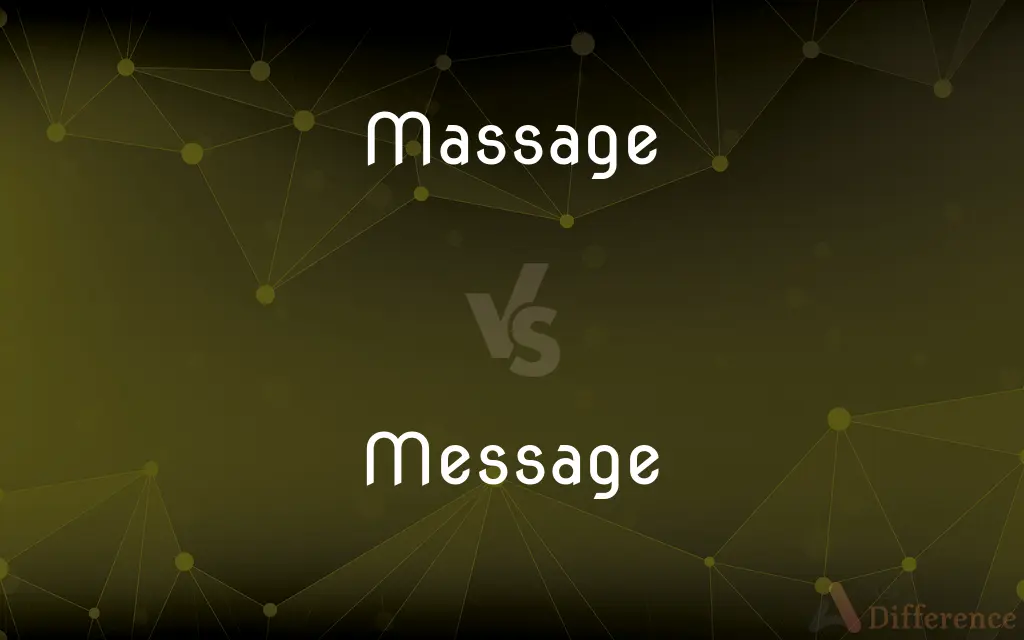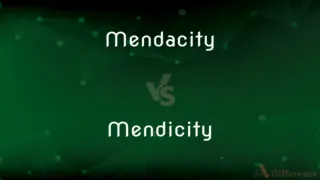Massage vs. Message — What's the Difference?
By Fiza Rafique & Maham Liaqat — Updated on April 4, 2024
Massage involves physical manipulation of the body for relaxation or therapeutic purposes, whereas a message is a piece of communication conveyed through words, signals, or actions.

Difference Between Massage and Message
Table of Contents
ADVERTISEMENT
Key Differences
Massage and message are terms that are distinct not only in their spelling but also in their meanings and applications. Massage refers to the act of kneading, rubbing, and applying pressure to the body's muscles and soft tissues. This practice is often therapeutic, aimed at relieving tension, enhancing circulation, and promoting relaxation. On the other hand, a message is a form of communication. It can be verbal or written, intended to convey information, feelings, or instructions from one entity to another.
The context in which massage and message are used highlights their differences further. Massage typically pertains to the field of physical therapy, wellness, and health care. It involves direct physical interaction with a person’s body to achieve relaxation or health benefits. Conversely, message finds its application in a wide array of contexts including personal communication, advertising, media, and technology. It does not involve physical touch but rather the transmission of information or sentiment.
While massage directly impacts the physical well-being of an individual, promoting healing and relaxation, a message influences the cognitive or emotional state. A message can inform, persuade, entertain, or inspire the recipient, depending on its content and purpose. The impact of a message can be as profound and far-reaching as the effect of a massage on the body, albeit in a non-physical manner.
Another angle to consider is the medium through which massages and messages are delivered. Massages are administered through hands-on techniques by therapists or, in some cases, through mechanical aids. Messages, however, are delivered via spoken words, written texts, digital platforms, or various forms of media. This difference underscores the tactile versus conceptual nature of massages and messages, respectively.
In terms of etymology, massage derives from various language roots related to touching and handling, reflecting its physical nature. Message, on the other hand, stems from Latin and Old French words for sending and mission, indicating its role in communication and the transmission of ideas.
ADVERTISEMENT
Comparison Chart
Definition
Physical manipulation of the body's tissues
A piece of communication
Primary Use
Therapeutic, relaxation
Information conveyance, communication
Context
Health care, wellness
Personal, media, advertising, technology
Impact
Physical well-being
Cognitive, emotional state
Delivery Means
Hands-on techniques, mechanical aids
Spoken, written text, digital, media
Etymology
Relates to touching, handling
Derives from words meaning sending, mission
Compare with Definitions
Massage
A wellness practice aimed at enhancing physical health.
Regular massages contribute to improved circulation and muscle tone.
Message
A piece of information or communication.
The message was clear and to the point.
Massage
The application of pressure to specific points on the body.
The therapist focused the massage on pressure points along the spine.
Message
A digital communication sent via electronic means.
She received a message on her phone about the meeting.
Massage
A method of treating injuries and promoting recovery.
The athlete received a massage to accelerate his recovery process.
Message
Verbal or written communication sent from one person to another.
He sent a message to inform her of his arrival time.
Massage
A therapeutic technique involving physical manipulation of muscle tissue.
She scheduled a massage to relieve her back pain.
Message
An announcement or statement.
The company issued a message regarding its new policy.
Massage
The act of rubbing and kneading the body to promote relaxation.
A good massage can work wonders for stress relief.
Message
An underlying theme or idea.
The film's message about hope resonated with audiences.
Massage
Massage is the manipulation of the body's soft tissues. Massage techniques are commonly applied with hands, fingers, elbows, knees, forearms, feet, or a device.
Message
A message is a discrete unit of communication intended by the source for consumption by some recipient or group of recipients. A message may be delivered by various means, including courier, telegraphy, carrier pigeon and electronic bus.
Massage
The rubbing and kneading of muscles and joints of the body with the hands, especially to relieve tension or pain
Massage can ease tiredness
A massage will help loosen you up
Message
A verbal, written, or recorded communication sent to or left for a recipient who cannot be contacted directly
If I'm not there leave a message on the answerphone
Massage
Rub and knead (a person or part of the body) with the hands
She massaged his tired muscles
Message
A significant political, social, or moral point that is being conveyed by a film, speech, etc.
A campaign to get the message about home security across
Massage
Manipulate (facts or figures) to give a more acceptable result
The accounts had been massaged to suit the government
Message
An errand
He would run those interminable messages after school to the bookie
Massage
The therapeutic manipulation of body tissues by a trained practitioner, as by systematic stroking, kneading, or application of pressure, to effect a beneficial physiological response such as pain reduction or improved circulation.
Message
Send a message to (someone), especially by email
I was messaged by a Californian contact for some information
The software package incorporates messaging, scheduling, and workflow functions
Massage
An act or instance of the therapeutic manipulation of body tissues. Also called therapeutic massage.
Message
A usually short communication transmitted by words, signals, or other means from one person, station, or group to another
I found the message you left at my desk. She sent me a quick message by email.
Massage
The rubbing or kneading of parts of the body to relax the muscles, aid circulation, or provide sensual pleasure.
Message
The substance of such a communication; the point or points conveyed
Gestured to a waiter, who got the message and brought the bill.
Massage
An act or instance of such rubbing or kneading.
Message
A statement made or read before a gathering
A retiring coach's farewell message.
Massage
An act or instance of erotic massage.
Message
A basic thesis or lesson; a moral
A play with a message.
Massage
To give a massage to.
Message
To send a message to.
Massage
To treat by means of a massage.
Message
To send as a message
Messaged the report by cable.
Massage
To coddle or cajole.
Message
To send a message; communicate.
Massage
To manipulate (data, for example)
Pollsters massaged the numbers to favor their candidate.
Message
A communication, or what is communicated; any concept or information conveyed.
We've just received an urgent message from the President.
Massage
The action of rubbing, kneading or hitting someone's body, to help the person relax, prepare for muscular action (as in contact sports) or to relieve aches.
Having a massage can have many beneficial effects.
Message
An underlying theme or conclusion to be drawn from something.
The main message of the novel is that time heals all wounds.
Massage
(transitive) To rub and knead (someone's body or a part of a body), to perform a massage on (somebody).
Message
An errand.
Massage
(transitive) To manipulate (data, a document etc.) to make it more presentable or more convenient to work with.
Message
See groceries, shopping.
Massage
(transitive) To falsify (data or accounts).
Message
To send a message to; to transmit a message to, e.g. as text via a cell phone.
Just message me for directions.
I messaged her about the concert.
Massage
A rubbing or kneading of the body, especially when performed as a hygienic or remedial measure.
Message
To send (something) as a message; usually refers to electronic messaging.
She messaged me the information yesterday.
Please message the final report by fax.
Massage
To treat by means of massage; to rub or knead; as, to massage a patient with ointment.
Message
(intransitive) To send a message or messages; to be capable of sending messages.
We've implemented a new messaging service.
The runaway computer program was messaging non-stop.
Massage
Kneading and rubbing parts of the body to increase circulation and promote relaxation
Message
(obsolete) To bear as a message.
Massage
Manually manipulate (someone's body), usually for medicinal or relaxation purposes;
She rubbed down her child with a sponge
Message
Any notice, word, or communication, written or verbal, sent from one person to another.
Ehud said, I have a message from God unto thee.
Massage
Give a massage to;
She massaged his sore back
Message
Hence, specifically, an official communication, not made in person, but delivered by a messenger; as, the President's message.
Message
A messenger.
Message
To bear as a message.
Message
A communication (usually brief) that is written or spoken or signaled;
He sent a three-word message
Message
What a communication that is about something is about
Message
Send a message to;
She messaged the committee
Message
Send as a message;
She messaged the final report by fax
Message
Send a message;
There is no messaging service at this company
Common Curiosities
What is a message?
A message is any form of communication or information shared between individuals or groups.
How can messages be delivered?
Messages can be delivered verbally, in writing, digitally, or through various forms of media.
What is a massage?
A massage is a physical therapy involving the manipulation of body tissues to promote health and relaxation.
How do massages affect the body?
Massages can relieve pain, reduce stress, improve circulation, and promote relaxation and healing.
Can messages be non-verbal?
Yes, messages can be conveyed non-verbally through gestures, facial expressions, and body language.
How do digital messages differ from traditional messages?
Digital messages can be sent instantly and widely, whereas traditional messages might be limited by physical or time constraints.
Can massages have negative effects?
If performed incorrectly, massages can cause discomfort or exacerbate certain medical conditions.
What makes an effective message?
Clarity, relevance, and engaging content contribute to the effectiveness of a message.
Are massages beneficial for mental health?
Yes, massages can have positive effects on mental health by reducing stress and anxiety levels.
How important is the medium in message delivery?
The medium significantly affects how a message is perceived and understood, making it a crucial consideration in communication.
How often should one get a massage?
The frequency can vary based on personal needs, goals, and health conditions; consulting with a professional is advisable.
Are massages only for adults?
No, massages can be beneficial for people of all ages, but techniques may vary depending on the individual's needs.
Can the same message be interpreted differently?
Yes, interpretations can vary based on the recipient's perspective, context, and background.
Do all massages require a therapist?
While many massages are performed by therapists, self-massage techniques can also be effective.
What role does feedback play in messaging?
Feedback is vital for understanding the message's impact and effectiveness, allowing for adjustments in future communications.
Share Your Discovery

Previous Comparison
Mendacity vs. Mendicity
Next Comparison
Petulant vs. ImpetuousAuthor Spotlight
Written by
Fiza RafiqueFiza Rafique is a skilled content writer at AskDifference.com, where she meticulously refines and enhances written pieces. Drawing from her vast editorial expertise, Fiza ensures clarity, accuracy, and precision in every article. Passionate about language, she continually seeks to elevate the quality of content for readers worldwide.
Co-written by
Maham Liaqat















































